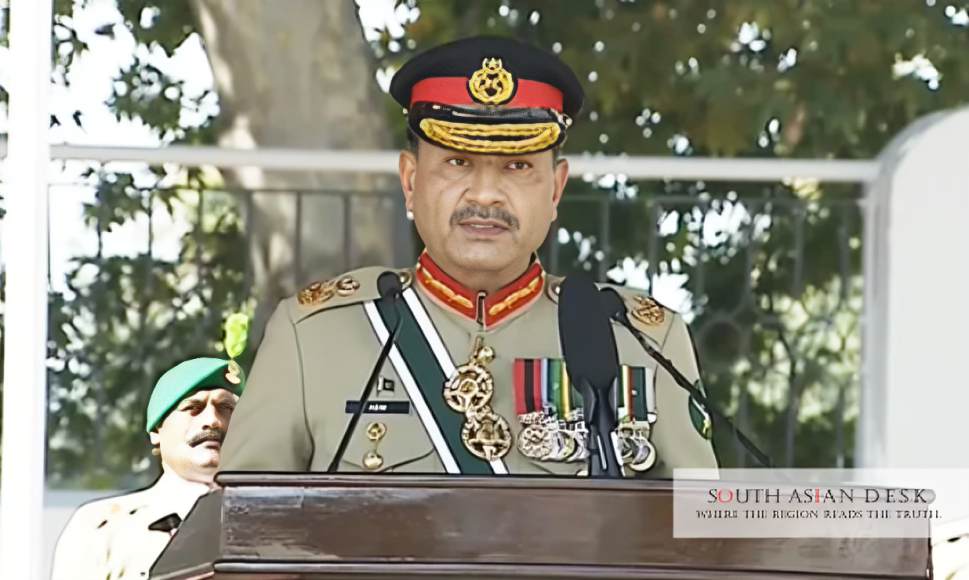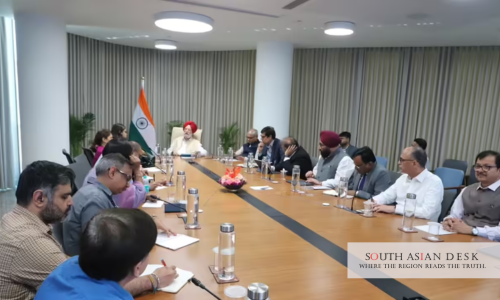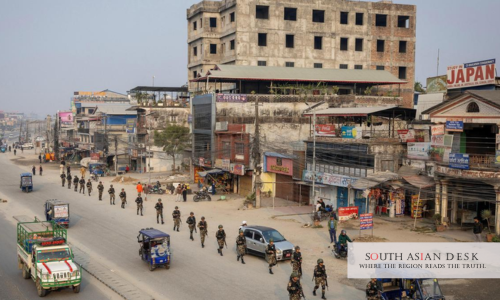Pakistan’s army chief issues a grave alert to India, stressing the catastrophic dangers of any armed clash in a region armed with nuclear war. Pakistan’s Chief of Army Staff, Field Marshal Syed Asim Munir, cautioned India that there is no space for war in a nuclearised environment during a passing out parade at the Pakistan Military Academy in Kakul on Saturday, October 18, 2025, where he addressed graduating cadets and highlighted recent military successes. This declaration by the Pakistan army chief warns India of the severe implications for South Asia, a region where nuclear arsenals held by both nations could trigger widespread devastation, affecting millions and destabilising international relations.
Pakistan Army Chief Warns India of Decisive Response
Field Marshal Syed Asim Munir spoke at the ceremony marking the commissioning of cadets from the 152nd PMA Long Course, 37th Technical Graduate Course, 71st Integrated Course, and 26th Lady Cadet Course. The event also included 40 cadets from friendly nations such as Malaysia, Nepal, Palestine, Qatar, Sri Lanka, Bangladesh, Yemen, Mali, Maldives, and Nigeria. He commended the graduates for their discipline and professionalism, noting the academy’s role in fostering military excellence.
In his address, the COAS Asim Munir cautions India nuclear war by emphasising Pakistan’s readiness to defend its sovereignty. He referenced a four-day conflict with India in May 2025, dubbed Operations Marka-i-Haq and Bunyanum Marsoos, where Pakistan’s forces downed advanced Rafale jets, targeted S-400 systems, and demonstrated multi-domain warfare capabilities. This engagement resulted in what Munir described as a clear victory against a numerically superior adversary.
The Pakistan army chief warns India that any fresh provocation would meet a response beyond expectations. He stated that Pakistan’s defence doctrine relies on credible deterrence and full-spectrum readiness, optimised through doctrinal and technological evolution into a dynamic force.
Key Statements on Nuclear Risks
Munir’s remarks included direct advisories to India’s military leadership. “I advise and firmly caution India’s military leadership that there is no space for war in a nuclearised environment,” he said. He added: “We will never be intimidated nor coerced by your rhetoric and shall respond decisively, beyond proportions, to even a minor provocation without any qualms.”
The COAS Asim Munir cautions India nuclear war further by warning: “The onus of ensuing escalations, one that may ultimately bear catastrophic consequences for the entire region and beyond will squarely lie with India.” He noted: “Should a fresh wave of hostilities be triggered, Pakistan would respond much beyond the expectations of the initiators.”
Munir elaborated on the diminishing distinctions between combat and communication zones, asserting: “The reach and lethality of our weapon systems will shatter the misconceived immunity of India’s geographic warspace.” He stressed that deeply hurting retributive military and economic losses would exceed the imagination of chaos perpetrators.
These comments align with secondary keywords where the Pakistan army chief warns India of no space for war in nuclearized environment, reinforcing the perils of escalation.
Context of Recent Conflicts
The speech referenced the May 2025 clash, where Pakistan claims to have neutralised threats with remarkable professionalism. Munir criticised India’s strategic blindness, hubris, and misguided hegemonic ambitions. He accused India of eagerness to assign culpability without neutral investigations, politicising terrorism for vested interests.
Pakistan’s armed forces, battle-hardened from over two decades in sub-conventional domains, displayed conventional prowess in the conflict. Munir praised the unified national response, including contributions from civilians, leadership, bureaucracy, scholars, scientists, media, academia, and youth, which renewed patriotism.
He assured the nation: “Let me assure the nation that with the help and mercies of Allah Almighty and support of the people, we will not lose an inch of this sacred land.” The COAS Asim Munir cautions India nuclear war by highlighting that Pakistan’s victory gained international admiration and unified the country against external and internal threats.
Munir also addressed broader regional roles, noting strengthened ties with Muslim countries, China through an all-weather strategic partnership, the United States under President Donald Trump’s peace efforts, and Saudi Arabia via the Strategic Mutual Defence Agreement. He mentioned Pakistan’s contributions to UN peacekeeping and mediation with Iran.
Background
Tensions between Pakistan and India have persisted since partition in 1947, with multiple wars and skirmishes over Kashmir and other issues. The nuclear dimension emerged after both nations conducted tests in 1998, leading to doctrines of credible minimum deterrence. The May 2025 conflict, involving air and ground operations, marked a recent escalation
Pakistan maintains a no-first-use policy for nuclear weapons but reserves the right to respond to threats. India has not officially responded to Munir’s latest remarks as of 4:35 PM on October 18, 2025.
The Pakistan army chief warns India amid ongoing border incidents and accusations of cross-border terrorism. Munir called on the Afghan Taliban to curb India-backed proxies operating from Afghan soil, adding another layer to regional dynamics.
No Space for War in Nuclearized Environment
Munir’s emphasis on no space for war in nuclearized environment reflects strategic realities. Both nations possess arsenals estimated at 170 warheads for Pakistan and 172 for India, per recent data from the Stockholm International Peace Research Institute.
Analysts note that such rhetoric aims to deter aggression while boosting domestic morale. The COAS Asim Munir cautions India nuclear war to prevent miscalculations, as past crises like the 2019 Pulwama incident nearly led to broader conflict.
Pakistan’s military spending reached PKR 1800 billion in the 2025 fiscal year, focusing on modernisation. Munir highlighted the need for intellectual readiness, innovation, and adaptability among troops to counter modern threats.
The parade itself showcased Pakistan’s military cooperation, with foreign cadets symbolising international ties. Munir paid tribute to martyrs, underscoring sacrifices since Pakistan’s creation.
What’s Next
Observers anticipate diplomatic exchanges or potential UN involvement if rhetoric escalates. Confidence-building measures, such as hotline communications between nuclear command authorities, remain crucial. As COAS Asim Munir cautions India nuclear war, both sides may pursue backchannel talks to de-escalate, avoiding a crisis that could engulf South Asia.
Published in SouthAsianDesk, October 18th, 2025
Follow SouthAsianDesk on X, Instagram, and Facebook for insights on business and current affairs from across South Asia.






